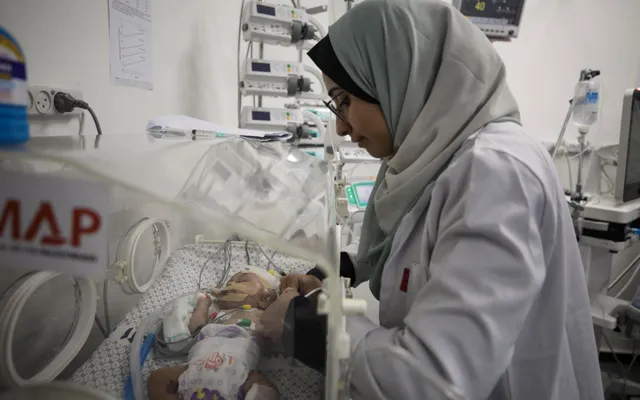NEWS. Medical Error Under Review After Infant Shows Signs of Life at Wake
In a rare and deeply distressing case that has drawn national attention in Brazil, an 8-month-old infant named Kiara was declared dead twice within a 24-hour period at the same medical facility. The incident, which occurred in October 2024 in Correia Pinto, Santa Catarina, has prompted an official investigation by local authorities and Brazil’s Scientific Police into the protocols followed by the hospital.

Infant Pronounced Dead at Hospital in Correia Pinto
On October 19, 2024, Kiara’s parents, Cristiano Santos and Katia Moreira, brought their unresponsive daughter to Faustino Riscarolli Hospital after finding her unconscious at home. According to hospital reports cited by local media, doctors were unable to detect a pulse or respiration. Following standard medical evaluations, Kiara was declared deceased and the family proceeded with funeral preparations.

Unusual Signs Observed at Wake
Approximately 16 hours after the death was certified, family members were gathered for a wake and final goodbyes. At that time, a relative noticed that the child appeared to show involuntary movement. According to statements from family members reported by O Globo and Mirror UK, the baby’s hand moved slightly and later gripped a mourner’s finger.
Emergency medical personnel were called to the scene. Upon arrival, responders assessed Kiara and detected a faint pulse and an oxygen saturation level of 84%. According to the Cleveland Clinic, an oxygen saturation level below 90% is considered critically low and requires immediate intervention.
Furthermore, family members and emergency responders noted the absence of rigor mortis, a natural postmortem condition that typically begins within 6 to 8 hours after death, depending on environmental conditions and other factors.

Second Hospitalization and Final Death Declaration
Following the surprising signs of life, the infant was transferred back to Faustino Riscarolli Hospital for immediate care. Despite efforts by medical personnel, the baby was again pronounced dead a few hours later.
As of mid-June 2025, the cause of death has been listed by hospital officials as natural causes. However, the specifics of the diagnosis have not been disclosed publicly, pending the completion of the ongoing investigation.

Local Authorities Respond with Investigation and Public Statement
In response to public concern, Correia Pinto City Hall released an official statement acknowledging the situation and offering condolences to the family. The municipality emphasized its commitment to upholding professional healthcare standards and launched a formal 30-day internal investigation in collaboration with the Brazilian Scientific Police, the national forensics agency.
The city’s statement included the following points:
- No death declaration should be issued without thorough and confirmed medical examination.
- All healthcare workers are expected to adhere strictly to protocols in determining a patient’s status.
- Staff are regularly trained to ensure that the wellbeing and life of patients are prioritized at all times.
- City Hall also pledged to review protocols and identify potential gaps in hospital procedures that may have contributed to the incident.

Examination of Medical and Ethical Implications
Medical experts have acknowledged that rare cases of premature declarations of death have occurred worldwide. In some situations, severe hypothermia or specific neurological conditions can mimic the absence of life signs. A 2018 report published in BMC Emergency Medicine notes that mistaken death declarations, though rare, are serious medical errors that demand review of protocol adherence.
According to Brazilian law, the declaration of death must be made by a licensed medical professional following clinical evaluation. In the case of suspected error, regional medical councils and judicial institutions may become involved to determine accountability.
The Federal Council of Medicine (CFM) in Brazil has previously issued guidance requiring doctors to certify death based on recognized clinical criteria, including absence of cardiorespiratory activity, neurological signs, and confirmation through ancillary tests when needed.

Public Reaction and Social Media Attention
The case has received widespread media coverage, not only in Brazil but also internationally. While the family expressed frustration and sorrow over the incident, healthcare authorities have urged the public to await the results of the official investigation before drawing conclusions.
Social media posts made by the child’s father express dissatisfaction with the response to the situation. However, officials have emphasized that any formal conclusions about procedural misconduct will depend on the findings of the investigative team.

Ongoing Investigation and Public Accountability
As of June 2025, more than 30 days have passed since the start of the formal review. The city has not yet published a final report on the outcome. However, Correia Pinto City Hall reaffirmed that any findings related to professional error or negligence will be handled according to national medical regulations and legal procedures.
The Santa Catarina Public Ministry, which oversees public interest investigations, has also acknowledged awareness of the case, indicating that further judicial action may follow if evidence of malpractice or administrative fault is confirmed.

Conclusion
The case of Kiara, the infant pronounced dead twice in the same hospital within 16 hours, has highlighted the critical importance of strict adherence to clinical death confirmation protocols. While rare, such cases demand both institutional accountability and rigorous review of medical procedures to prevent recurrence.
The incident continues to serve as a focal point for broader discussions on emergency response, death certification practices, and communication between healthcare professionals and grieving families.
Editor’s Note:
This article is based on verified information from government sources, public health institutions, and reputable news organizations. It is presented to inform public understanding of healthcare practices and procedural accountability in Brazil. All statements about medical procedures, regulations, and events are derived from confirmed reports available as of June 2025.
For additional reading on medical error and death certification standards:
Cleveland Clinic: Oxygen Saturation Levels and Critical Signs
Federal Council of Medicine (CFM) Brazil: Clinical and Legal Death Protocols
BMC Emergency Medicine: Medical Errors in Emergency Departments













